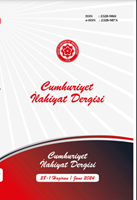Muġni’l-Ḳurrâʾ fî Şerḥi Muḫtâri’l-İḳrâʾ Özelinde ʿAṭâʾullâh Mesleği’ne Ait Tercihlerin Mahiyeti
The Essence of Preferences of the Methodology (Maslak) of ʿAṭāʾ Allāh in the Context of Mughnī al-Qurrāʾ fī Sharḥ Mukhtār al-Iqrāʾ
Author(s): Muhammed PilgirSubject(s): School education, History of Islam, Sociology of Education, Sociology of Religion, History of Religion, Qur’anic studies
Published by: Cumhuriyet Üniversitesi İlahyat Fakültesi
Keywords: Qirāʾāt; Taḥrīrāt; Maslak of ʿAṭāʾ Allāh; Mughnī al-Qurrāʾ; Preference (Tarjīḥ); Taqdīm-Taʾkhīr;
Summary/Abstract: In this study, the nature of the preferences (tarjīḥ) of the maslak (methodology) of ʿAṭāʾ Allāh, which is one of the maslaks used in qirāʾāt education in Türkiye, has been presented in the context of Muḥammad ʿĀrif al-Ḥıfẓī's work called Mughnī l-qurrāʾ fī sharḥ mukhtār al-iqrāʾ and within the boundaries of the al-ʿashr alṣughrā curriculum. The qirāʾāt maslaks, which were formed in the Ottoman Anatolian territories and are unique to Anatolia, have continued to exist in qirāʾāt education until today. Although these maslaks are the taḥrīrāt school, they have survived to this day as a terminology that is almost unknown outside Anatolia, unrecognized, and not included in qirāʾāt education and training. While this is the case, although the maslak of ʿAṭāʾ Allāh, one of the maslaks in question, has been used in qirāʾāt education until today, it has been observed that there is not enough academic study on it. As a matter of fact, two studies related to the maslak of ʿAṭāʾ Allāh could be identified. One of these is doctoral thesis, and the other is master's thesis researchs. Apart from this, there is also a study published as a book chapter called "Kırâat Eğitiminin Dünü, Bugünü, Yarını ve Kırâat Eğitiminde Meslekler", which touches on maslaks in general, and research titled Kıraat İlmi Eğitim ve Öğretim Metotları, which devotes a section to maslaks. Among these mentioned scientific activities, no study has been found that reveals the nature of maslak preferences, except for Ahmed er-Rüşdî ve Mürşidü’t-Talebe Adlı Eserinin Kıraat İlmindeki Yeri. However, work in question has been discussed mostly with a view to Murshidu'ṭ-ṭalaba, who is considered the main source in the teaching of al-ʿashr al-kubrā of ʿAṭāʾ Allāh's maslak, and the analysis of the wajhs and preferences contained in this work. Therefore, in this study, where we attempt to fill the current gap, we have explained; that the wajhs mentioned in Mughnī l-qurrāʾ, considered a fundamental source in teaching al-ʿashr al-ṣughrā of the maslak of ʿAṭāʾ Allāh, have been addressed, and the nature of these preferences, along with examples related to uṣūl and farsh al-ḥurūf, has been presented. In this context, the main purpose of the study is to explain the background of the preferences regarding the maslak of ʿAṭāʾ Allāh in the context of Muḥammad ʿĀrif al-Ḥıfẓī's work called Mughnī l-qurrāʾ fī sharḥ mukhtār al-iqrāʾ. Moreover, the nature of the preferences related to the mentioned maslak has been attempted to be clarified under the light of the works al-Taysīr fī l-qirāʾāt al-sabʿ and Ḥirz alamānī wa wajh al-tahānī fī l-qirāʾāt al-sab, which are the basic sources of the al-ʿashr al-ṣughrā syllabus. In addition to these works, by making use of the basic works of the qirāʾāt literature, the place of the preferences of the ʿAṭāʾ Allāh maslak in the relevant works and the reasons for these preferences are explained. Thus, it has been determined that all of the marwī(narrated) wajhs are preferred in the maslak of ʿAṭāʾ Allāh in all of the examples given specifically for Mughnī l-qurrāʾ; but it has been seen that the wajhs, which are stated to be opposed to al-Shāṭıbī's own isnād/transmission, are mentioned as muʾakhkhar wajhs, except for the last example. However, in the last example included in the study, it was observed that the muḫāṭab wajh was preferred as the muḳaddam over the ġāib wajh, even though there is ṭarīq opposition. Nevertheless, in the relevant examples, it has been determined that the wajhs performed by the maslaks of Ītilāf, Mutqin, and Ṣūfī are generally compatible with each other and that they differ from the maslak of ʿAṭāʾ Allāh in these wajhs.
Journal: Cumhuriyet İlahiyat Dergisi
- Issue Year: 28/2024
- Issue No: 1
- Page Range: 242-263
- Page Count: 22
- Language: Turkish

